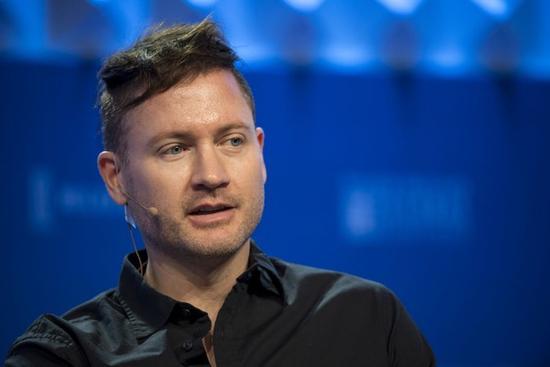
Human intelligence company Kernel founder Brian Johnson
According to a report on the "Connected" website on July 7, the brain-computer interface is a new hot spot in the current technology industry. In the view of Bryan Johnson, founder of the human intelligence company Kernel, it may be in the future. Realized during the year.
The implantation of a microchip in the brain to strengthen its power has long been a science fiction story. Nowadays, the brain-computer interface has suddenly become a new hot spot in the scientific and technological community. This spring, Tesla CEO Elon Musk founded the new company Neuralink to get involved in the field. Facebook demonstrated at the F8 Developer Conference a video of a person with ALS (Atrophic Lateral Sclerosis) typing using the brain. But in fact, some people entered the game earlier than Musk and Facebook. Entrepreneur Brian Johnson sold his company Braintree to PayPal for 0 million in 2013 and made a huge profit. Last year, he spent 0 million to create the Kernel company and set out to explore how to develop and implant chips for the skulls of patients with Parkinson's disease and Alzheimer's disease, and then adapt their neural networks to restore some of their lost abilities.
However, helping to restore a damaged brain is only an entry point for the Kernel. The 39-year-old Johnson is from Utah. He is very much looking forward to healthy people who can get the brain to strengthen the day. He has become one of the most talkative evangelists who have reshaped the human brain. There is no doubt that this kind of project will raise a lot of questions - Backchannel editor Steven Levy (Steven Levy) mentioned this to him in an interview recently. Does his answer make you choose to get a brain-computer interface? (Warning: The process is invasive, but Johnson hopes to find an implementation that will not cause serious damage to people in the future.)
The following is an excerpt from an interview with Johnson:
Levy: Why do you want to implant chips into the human brain?
Johnson: The next border of human ambition is in our brains. We are currently understanding this world through our sensory mechanisms. As we “unlock” our brains, we will find thousands or millions of ambition peaks.
Levy: We have no new ambitions to subvert. Now we have to make up for it?
Johnson: After seeing a list of things I might be able to do now, I would like to have more options on top.
Levy: These are things that you want to do, but do you think your ability is limited because your brain is not strong enough?
Johnson: Yes, I think I'm extremely limited in my current brain form, whether it's the ability to process information, or to memorize information, digest information, and think about information. Even my imagination - the ability to contemplate what I don't know - is limited. I can only imagine what I am familiar with.
Levy: Are some of these concerns not resolved through human-machine intelligence collaboration? In that case, we don't have to change our brains.
Johnson: I ask you: In 50 years or 10 years, what will humans become? What does it mean to be human?
Levy: I don't know the answer, maybe my brain is too small.
Johnson: Humans now dominate the earth because we are the most intelligent lives. Therefore, we can decide what to eat, what to raise as pets, what species to extinct, which species to save, what animals to mow, and what to clone. We are now developing a new form of intelligence in the form of AI. Whether it is conscious or not, it will become more and more powerful. Humans need to become important presences decades later. They have no choice but to unlock our brains and interfere with our cognitive evolution. If you try to imagine a world that will make us happy after 30, 40, and 50 years, if we can't find a way to read and write our neural code, that future cannot be achieved.
Levy: At present we can't find a solution. What makes you think we can even find ways to achieve this in decades?
Johnson: What do we know before we try to sequence the genome? What do we know before we try to go to the moon?
Levi: Really, what makes you think we can "unlock" the brain and make us super smart?
Johnson: I have no confidence in our success. That is the most sensible and honest answer I can give. It is widely believed that the brain is extremely complicated. But we didn't have the tools to properly explore it before, so we don't know if it's that complicated. We may achieve breakthroughs in the basic understanding of the brain within 5 or 10 years.
Levy: You said that one of the things that might benefit mankind is to adjust our brains to let us do more positive things. For example, do not fight - by transforming our brain, will we become less hostile?
Johnson: Those will become options, I hope that will become an option.
Levy: Changing our emotions by changing our brains sounds awful to me. Have you ever seen the Black Mirror, which talks about future despair and the drawbacks of technology?
Johnson: I have seen it. For emerging technologies, we always have this feeling. Many people will have the same instinctive response when they hear about changing things like the brain: "That's terrible. I feel very uneasy. I just like myself." As people become able to accept this idea, They will be immersed in it and seriously consider other potential issues. Why do we think we are so terrible? Why do we think we are now the sacred standard? Why do you think that changing the brain requires some very big reason? Hasn’t humankind been constantly working to change itself? For example, by meditating like mindfulness. Are we not dissatisfied with ourselves?
Levy: Those are internal changes. I think the thing that you are suggesting may be terrible is that it is not just about reprogramming your brain, it may also have something implanted in your brain.
Johnson: I think that something is different from a mobile phone when it comes to implanting things into the brain. But all these things are part of the technological evolution we have been experiencing. For emerging technologies, we always have this kind of argument. The answer to these problems is that I want to live in a pleasant world. In a world that makes me feel safe, I can exert my creativity to the fullest. I feel the purpose and meaning of life.
Levy: But if some people can enhance their ability through brain enhancement, will those who have not changed their brains be at a disadvantage? They may not be competitive in their studies, workplaces or even cocktail conversations. So changing the brain is not a choice, right?
Johnson: What do you think of someone who can go to school in a private school and some people are trapped in schools in the inner city?
Levy: I feel bad.
Johnson: So this is already happening. People somehow feel that cognitive improvement is new. It is not. We just have different forms of cognitive improvement. Private education is a form of cognitive improvement. Humans always do their best to maximize their abilities. If we add technology to the human brain, then it is a continuation of what humanity has been doing for a long time. Now, I hope we can develop technologies that can be used by billions of people. The key point is that this is not new.
Levy: Do you think this is inevitable?
Johnson: No doubt.
Levy: Then you estimate when the computer chip implanted in the brain will be achieved?
Johnson: It depends on the type of technology and whether the country allows this choice. If I have a healthy brain, when will I implant the chip? I will say 9 to 10 years.
Levy: Do you think that the books that we are out of 100 years from now are too basic to see?
Johnson: That's for sure.
Levy: All the masters will look like line characters who are not worth mentioning.
Johnson: I don't agree with this point. Future people will piece together the entire story to review this evolutionary process. For example, who did what? Who contributed to our present happy life? What good things have we done to this species?
Levy: But I think that you are talking about human activities moving from a biological evolutionary orbit to something that allows humans to suddenly enter superpower artificial evolution. This evolution will change the definition of "human".
Johnson: That's it. We are now in an age of self-directed evolution, whether it is from the genetic, biological, neurological or physical point of view. I am just waiting for a country to stand up and say, "We are the destination of human potential. Bring your technology, we together to enhance human potential."
Levy: Is there a country now considering that?
Johnson: I have secretly conducted some discussions. I want to say that everyone's interest is bigger than many people think. When it comes to the competitiveness of the country, I think that once it erupts, it will explode very quickly. (Lebang)
Bakelite Material
Bakelite Material,Bakelite Plastic,Bakelite Made From,Bakelite Synthetics
WENZHOU TENGCAI ELECTRIC CO.,LTD , https://www.tengcaielectric.com
برچسب:
،
ادامه مطلب
بازدید:

































